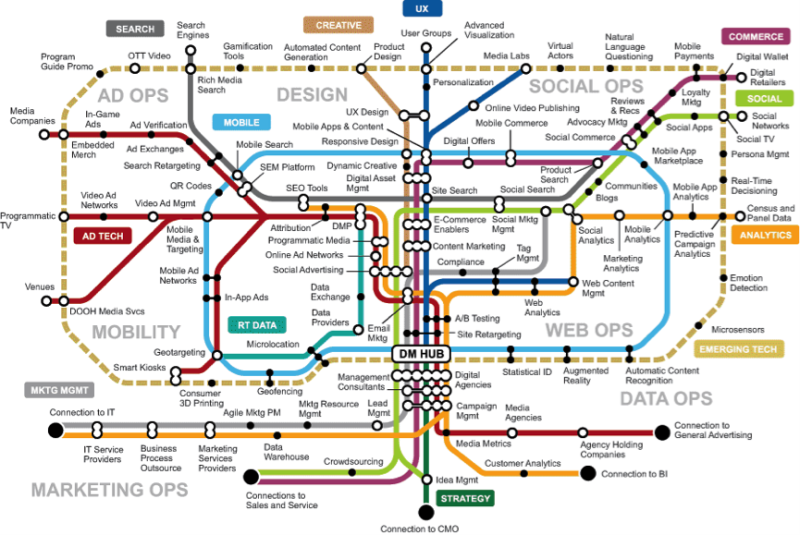Today’s Marketer: Preparing for the Future, Embracing the Current
Marketing 2.0? No. Marketing. Full stop.
Throughout the last decade, and with the rise of “2.0” in every discipline and linked to every possible buzzword, the idea of “marketing 2.0” has not been spared. The element of technology in the form of automation tools, online demand generating platforms and analytical software lays the foundation of this futuristic marketing style. However, the people, processes and tools required for a fully functioning marketing machine to pave the way for any successful business inherently embrace all of these elements in today’s world. We’re not discussing the “future of marketing” anymore. We are looking at the “now”.
Whether in B2B or in B2C marketing, organizations at the forefront of their industries place significant weight on their CMOs and strategic marketing teams. “Sixty-seven percent of marketing leaders say they play a leading or significant role in the corporate strategy setting and almost two-thirds say that the purchase of marketing technology is decided either entirely by marketing or by a marketing-led hybrid team,” according to a recent Gartner blog. Not surprisingly, knowledge of marketing technology is a highly sought-after element in any marketing hire today. While in recent years there were specialized roles, such as “marketing automation specialist” or “online marketing expert”, within the more modern of companies, these roles and their general skillsets are fast becoming standard requirements everywhere. As Forrester also points out in a 2016 report, there has been a definite wake-up call to ensure offline and online marketing align, and that digital outreach to the customer base along all points of the customer journey are key.
Technology spend by CMOs will increase 10X in the next 10 years, to $120 billion from $12 billion, according to Foundation Capital. Technology does not exist in a vacuum, of course. The marketing organization of today requires every marketer within it to understand and also embrace the value of the tools at hand – from engaging with customers to creating brand awareness amongst potential buyers still 10 steps earlier in the buying cycle. Many companies still have some ways to go, as an upcoming PwC survey reveals in its 10th Digital IQ survey – “Just 52 percent of participating companies rated their digital IQ as strong/very strong.”*
What does that mean for individual marketers?
Gone are the days of simply being a “pro at running events” or “whiz at flyer design”. The marketer of today should see the positive aspect of having so many tools, access to experts globally and a wealth of valuable data at hand. To anyone setting out to become a marketing professional now, the world has never given you a better shot at succeeding, considering the tools at your disposal.
What does this digital landscape in marketing look like, according to Gartner?

Gartner technology and digital transit map
Old School vs. New School: Marketing Today
Let’s bridge the gaps between old-school and new-school marketing – since technically, there should be none as of right now.
Below is an example of just four typical marketing areas in order to demonstrate the shift towards technological advancement.
| |
Yesterday |
Today |
Tools |
| Event marketing |
- Signing up to trade shows
- Choosing a booth scheme and potential speaker
- Selecting giveaways and perhaps a raffle game with prize
- E-mail or paper invites to select audience
|
- PPC campaigns (e.g., LinkedIn, Twitter, Facebook) targeting your potential audience to attend your session and stand
- Landing pages with content around your theme for additional lead gen
- Scanning linked to marketing automation for real-time follow-ups and outreach
|
- Social media platforms
- Marketing automation tools
- Mobile apps and scanners
- Landing pages (e.g., linked back to automation tool, such as Marketo)
- Streaming or video on demand for additional content marketing
|
| Collateral marketing |
- Creation of success stories or product brochures, whitepapers
- Printing and distribution
- PDF creation and hosting on own website
|
- Landing page creation via marketing automation tool, hosting gated version of content
- Content syndication via external vendors; placement of thought leadership portals
- Nurture campaign distribution
- PPC and organic campaigns including social media for lead generation
|
- Marketing automation tools (e.g., Marketo, Eloqua)
- PPC services
- Social media
- Content syndicators and media hosting services (e.g., IDG)
|
| Customer reference marketing |
- Site visit/events
- Success story creation
- Speaking slots at external events
|
- Thought leadership webinars
- Video testimonials
- Nurture campaigns with multiple content items
- Customer network portals for real-time info. Exchange
|
- Webinar tools (e.g., Webex, GoTo Webinar)
- Marketing automation tools
- Social media platforms
- Web forums
|
| Telemarketing |
- Cold-calling based on company lists
- Follow-up calls based on event or inbound lead lists
- Invitation campaigns to internal or external events
|
- Prioritization of cold vs. warm vs. hot prospects via marketing intelligence (user reporting through marketing automation tools)
- Nurture template emails
- Social media outreach and lead lists with alerts regarding new activity
- Target company information gathering
- Progress and conversion reporting and analysis
|
- CRM tools (e.g., Salesforce)
- Marketing automation tools (e.g., Marketo, Eloqua)
- Social media (e.g., Sales Navigator by LinkedIn)
- Market data brokers (e.g., data.com)
|
So, the next time I hear someone romanticize brochure creation, event organization, contest and giveaway planning and a dash of PR writing without any element of technology supporting these tactics, I’ll assume they are also enthusiastic riders of a penny farthing and perhaps sport a lovely handlebar moustache.
Hop on that e-bike and join us in 2017.

Janine Olariu
Janine is a marketing and sales professional based in Dublin, Ireland, with a history of director roles at SaaS, FinTech and social media companies across Europe. With over 10 years in strategic B2B marketing roles, Janine enjoys sharing her experiences and best practices on demand generation, the customer buying journey and marketing-influenced deal acceleration throughout the sales cycle.